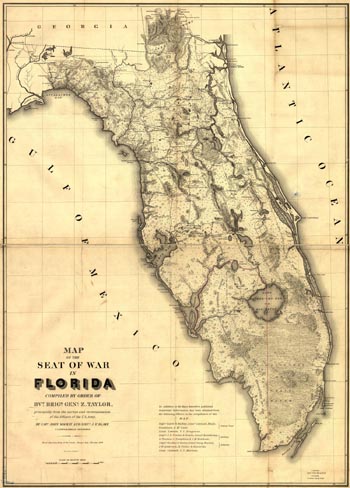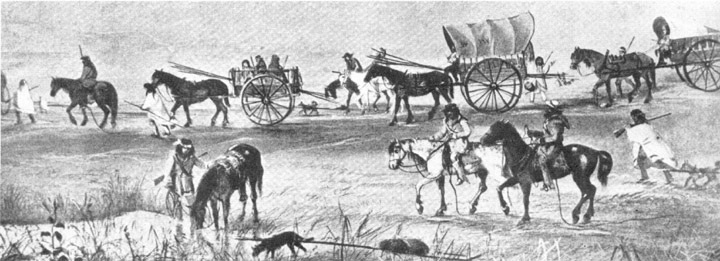Published in What If? A Journal of Radical Possibilities, Vol. 2 Aug. 2002
Rest still, relax, sleep. Yes, sleep. But while you lie here in the twilight between consciousness and dreaming, let me tell you about things that used to be. Maybe this will help you envision a world different from the one out there. Maybe thoughts of bravery against adversity will inspire you to dare believe that we, too, can create our own society, with liberty, compassion and equality – rather than bureaucracy, injustice, and genocide – as its foundation.
You see, what you learned in history classes, or from TV and movies – this is not the truth. Not the complete truth. Some stories are not told. Do you know about a placed call Fort Negro? (It was actually called “Fort Nigger” by the U.S. military and local politicians.) Do you know who the Seminole people were? Have you heard of the Cibaleros? No? But – let me tell you from the beginning…
In a land they called Florida, a place of sand and swamps, Spanish explorers first attempted a colony in what is today our nation. They were extraordinarily unsuccessful. The native were very uncooperative. There was also the matter of tropical disease. The Spaniards repeatedly attempted to enslave the local people, who promptly disappeared into the swamps. They only  reappeared to burn Spanish settlements and fields. When the Spaniards then brought African slaves to Florida, they also imported African diseases. As happened time and again throughout the Americas, these introduced diseases weakened the native Peoples to the point that they were no longer able to resist the invaders.
reappeared to burn Spanish settlements and fields. When the Spaniards then brought African slaves to Florida, they also imported African diseases. As happened time and again throughout the Americas, these introduced diseases weakened the native Peoples to the point that they were no longer able to resist the invaders.
We know how foul slavery is, even those of us who have only suffered wage slavery, not chattel slavery. It is no surprise to us that the slaves would try to escape. What perhaps is surprising is that the native People of Florida, desperate to replenish their dwindling ranks, accepted these renegades into their societies. And when their numbers were again great enough, they returned to the burning of Spanish plantations. Band societies are known to raid other people to renew their populations. Their captives are referred to as slaves. This word has a very different meaning, however, for people in tribal societies. They will treat their captives as any other member of their band, once the slaves have earned the trust of their captors.
The fugitive slaves among the people of Florida delighted in “capturing” other slaves from the Spaniards. And so a new people arose who were both African and Indigenous. These were the Seminoles. Of them more later; first I want to tell you about Fort Negro.
The Spaniards wished to dominate the entire Gulf Coast. To do so, they built a fortress, later to be known as Fort Negro, in northwestern Florida, what is now called the panhandle. But they could not sustain their settlements in Florida because of continual raids by Seminoles. The fort itself was eventually taken over by rebellious slaves, with the help of marauding escaped-slave pirates. For a time, Fort Negro resisted assaults by Spanish and British forces. Imagine for a moment, my friend, the world today if Florida had never become part of the USA. What if instead, Florida was a free nation built by escaped slaves and native people? It was so, for a while.
The infant US nation could not defeat the Seminoles either. It could not capture the citadel its leaders derided as “Fort Nigger,” even after three separate military campaigns. The fort-dwellers were enraged by the attacks against them, and they retaliated by launching raids into Georgia, Mississippi and the Carolinas. They burned plantations and escorted liberated slaves to freedom and security at the fort.
leaders derided as “Fort Nigger,” even after three separate military campaigns. The fort-dwellers were enraged by the attacks against them, and they retaliated by launching raids into Georgia, Mississippi and the Carolinas. They burned plantations and escorted liberated slaves to freedom and security at the fort.
So, did you learn in your history books that the USA fought its first major war of expansion against the free people of Florida? Probably not; this is not a thing to boast of, that the newly independent US attacked a free, egalitarian society in order to protect the property rights of slaveowners. No, these are lessons best left unlearned…
In New Mexico, when the Spanish discovered the Pueblo societies, they hoped that they’d come across another wealthy empire like that of my ancestors, the Aztecs, to the south. Several private fortunes were exhausted in the search for El Dorado, a land of legendary wealth which always seemed to be located a few days journey from wherever the would-be conquistadors stood. Rather than risk the humiliation of admitting they had been had, the Spaniards determined they would create a wealthy colony along the banks of the Rio Bravo and Pecos River. As was usual for them, the Europeans attempted to enslave the local natives. Except that here, where the Pueblo, Plains, Desert and Mountain Peoples co-mingled, and far from major European settlements, the Spaniards found themselves isolated and vulnerable to attack. They endeavored to secure peace with the various tribes. First they tried conquest. But because of the long tradition of trade and friendship among the Pueblo Peoples, they arose as one enraged mass and drove the settlers away.
To avert yet more humiliation after having abandoned Florida, the Viceroy of New Spain then set out to reconquer the province of New Mexico. One Pueblo was annihilated as an example to the others. The might of artillery and gunpowder eventually won out against the beauty of dances and songs. But the kachinas are very powerful spirits, and as the settlers built their vision of a New Mexico in the fertile lands along the Rio Bravo among the Sangre de Cristo mountains, their haciendas came to resemble the surrounding pueblos more than Spanish villages.
Raising their own sheep, cattle, corn and wheat, the settlers did not enjoy the lordly larder their compatriots stole from the indigenous Peoples in other parts of the Americas, but they 
were self-sufficient. If not for one thing, their lives would have been carefree, almost paradisiacal: the Peoples of the Plains – the great, fierce, horse-nations, often came to the pueblos to trade — or to pillage. The settlers attempted to drive the Apaches, Kiowas and Comanches away. The raiders always returned. Eventually, the Spaniards realized the value of peaceful trade with the Plains Peoples. Their trading partners would even help drive away other hostiles who raided from the north.
As the descendants of the settlers adopted more of the culture of the Pueblos and traveled and lived with the Plains Peoples, newly-appointed regents complained that it was becoming difficult to tell the “savages from the Christians.” A unique subculture thrived in New Mexico. People of Spanish and mixed blood who planted corn and other crops in the spring went off to Texas and the plains beyond to hunt buffalo and antelope in the summer, then returned home in the fall to harvest their crops and enjoy a leisurely winter. Because of their familiarity with all the Peoples of the region, the New Mexicans, called Cibaleros, flourished, whereas the colonies in what is now Texas and northern Mexico fought to exterminate and drive away indigenous tribes. And they paid a high price for their arrogance: two centuries of continuous carnage.
But in New Mexico, the Cibaleros acted as intermediaries in disputes, interpreters, guides and envoys, to foster trust and cooperation between the various Peoples of the region. For well over a century this went on, until the Americans came.
It was the Texans who tried to crush the Comanches – who were as strong allies of the Cibaleros as they were enemies of the Texans and Mexicans. The Texans failed so spectacularly that at certain points their colonies nearly disappeared. But European land-hunger meant that more settlers always came along.
Just as the culture of the Cibaleros faded, the American pioneers moved into Texas and the Great Plains. There would be no place for co-existence with native peoples in America. Anyone who argued otherwise was denounced, persecuted as a race traitor.
Native Peoples, of course, continued to fight. Seminole society had fragmented after Florida was at last conquered by the Americans. Some hid deep in the swamps. Others accepted the American offer of refuge in the concentration camps (reservations) of Oklahoma.
Even as the dream of multiracial cooperation was being crushed by the Texas militia, even as the Cibaleros faded from view, the Seminoles fought once again for their dignity and liberty. Unhappy with a desolate life of hiding, a band of Seminoles set out westward to rejoin their kinfolk, seeking once again to be a mighty People. They fought their way across the coastal lands and through the plains, until they reached their kin on the reservation.
Untied again, they set out to find a place to establish their own homeland, outside of the jurisdiction of the USA, which saw them as subhuman savages. Texas proved to be even more hostile towards native Peoples than either Florida or Oklahoma. The Seminoles found no peace there. When they migrated across the Rio Bravo into Mexico, they were welcomed and able to stay if they agreed to help defend the territory from raiding Apaches, Kiowas and Comanches. No country had ever offered the Seminoles a chance for acceptance before, and they built their homes along the Rio Bravo, where their descendants still live.
Can you glimpse now how different our world might be? Look how different the past can be, depending on who tells the story. The future can also be different, if you – here and now – decide to make it different. But you must stop doing as you are told, and do as you feel. What do machines care about you and your dreams? And why, then, do you let machines dominate your life so? Sleep now and dream of ways of living that honor you as a creature of the verdant, living Earth. Hold on to those dreams and realize that they are reality, if you desire and work for it to be so.

The seeds for different paradigms to live in are still being fermented. We need patience, and a predisposition to learn from the best aspects of every era in human history.
Most people are still partially or wholly blind to the value of Pachamama, or humane societies built on true freedom and equality. Rationalist-industrialist materialism has just joined the old religions in suppressing a facet of human truth (this time the ecological and spiritual). It will still be a good while before the majority of humankind rediscovers this spark.
LikeLike
i can’t agree with being patient…it’s already too late for most people – particularly americans – to save their lives. i can’t see myself being alive next year because no one i know has done anything to prepare for the worst. kinda sad to be so aware of what is going on all around, but being powerless to do anything about it.
LikeLike